Thomas E. Ricks's Blog, page 215
November 30, 2011
Where to chow down in Beirut these days

Nicholas Blanford, author of some
book about the Hezbies, discusses the Beirut food scene in Ex's blog:
"I am out of touch with most bars in Beirut these days. I
preferred the good old days when there were perhaps three bars in Beirut, the
best of which was the Lord Kitchener which was at the back of an abandoned
shopping center in Hamra and had a very laid-back speakeasy-type atmosphere and
a wicked oud player. As for food, still love Le Chef, an institution. Best cafe
is Cafe Younes in Hamra. I used to live above the cafe in 1995-96 when it was
just a place to buy freshly ground coffee and knock back a double espresso in
the morning. Otherwise, it's local cafes and restaurants dotted around the
country. Eat foul in the Tyre souq. There's a brilliant sandwich place in Dar
al-Wassah in the Bekaa -- best labneh sandwiches in Lebanon. I also stop at Abu
Rashed next to the army barracks in Marjayoun. They make terrific shish taouq.
Corny though it may sound, the best meal is the one with a couple of spit roast
chickens, olives, bread and with the family on a picnic somewhere high up in
the mountains."
November 29, 2011
Fixing the Army (VI): How can officers hold NCOs to standard if they don't know what sergeants are supposed to be doing?
By "Petronius
Arbiter"
Best Defense department of Army affairs
Training

Increase course length in both officer and enlisted IMT. This is the critical time in officer and Soldier development. Purpose of doing so largely is Soldier and leader confidence; probably the most important ingredients of soldiering and competent units.
Train the officer corps to know what their enlisted Soldiers and NCOs are trained to do. In doing this it will require officer involvement in NCO training. It will require officer involvement in NCO training development. We as an Army are a total anomaly in the military community in not having officers involved in training our NCOs. Other ground forces shake their heads in disbelief at this issue. It is difficult for an officer to hold an NCO to a standard if he does not know what the NCO is trained to or expected to be able to do.
Restore "Crawl, Walk, Run" in the minds of all trainers in the Army. It is simple, easily understood and long standing great guidance on how to train.
All training should be "multi-echelon" in order to better utilize all training time available. This phrase has taken a back seat for some reason. Restore to the training vernacular.
Soldiers learn by seeing and doing, over and over again. "Performance Oriented" training is another time tested way to do training correctly.
Limit (I say limit, not stop) actual firing of large caliber weapons systems. Simulations for all weapons systems are key. Rapidly expedite fielding of simulations for mortars, artillery, heavy machine guns, etc. There is great fiscal responsibility in doing this and doing so will also produce better trained fire support organizations. A mortar platoon simulations would probably pay for itself in first month of use; likewise the same applies with other large caliber weapons systems.
Pathfinder and Air Assault produce similar skills. If so, consolidate the two into one course, determining what the skills, knowledge and experience are needed for the Soldier. You pick the badge. Or simply eliminate one or the other, your choice.
Reinstitute calling CGSC, the "Staff College" or "Command and General Staff College." ILE sounds like a disease and definitely in not a descriptive term for that level of schooling.
Bring back the bayonet. My guess is there were some in Afghanistan who had wished they had it. Bayonet training instills aggression in Soldiers. There are times, especially in STABOPS, where a weapon with fixed bayonets has a tremendous impact on people getting the right message. But, if you don't even carry a bayonet, it is real hard to instill that "cold steel" feeling in someone when you give the command "Fix Bayonets."
Examine closely the relationship between constant roadmarching and disability. Does roadmarching make you better, more prepared or does it debilitate your body? Can you better prepare for roadmarch requirements by other, less abusive forms of fitness? I think so.
Restore Soldier traditions; walking on left of superior, reporting criteria, stand at attention when talking to an officer, parade rest when talking to senior NCO, etc.
Establish a Skill at Arms course that will make our junior Officers and NCOs experts in weapons systems, ranges and training. Take a lesson from the Brits on this one.
Make Digital Training Management System (DTMS) work for the commander, not the commander work for DTMS. Fix it and they will use it. Don't fix it and they won't.
Restore retreat formations to instill Soldier understanding of tradition.
A quote of the day about performing Shakespeare for the troops in Kabul

"When you do 'Henry V' for a roomful of men in uniform with
guns on their hips and M-9s under their chairs, it takes on a whole different
meaning.''
-- Tyrus
Lemerande, a Navy reservist, quoted in the Boston Globe after entertaining troops with a one-man show
featuring selections from Shakespeare.
LeMay vs. MacArthur: A smackdown of the right-wing nut four-star generals
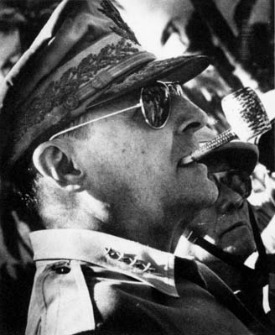
I'd kind of assumed that Gen.
Curtis LeMay would be a fan of Gen. Douglas MacArthur, because both were
right-wing nuts. So I was surprised to read this comment in an interview with
LeMay:
"I'll pick out some people who were
supposed to have been good leaders. Let's take MacArthur. I wouldn't follow
that man out to the outhouse because I don't like him. I don't like his
methods …"
(P. 88, Charles Jones and R.
Manning Ancell, editors, Four-Star
Leadership for Leaders.)
November 28, 2011
Fixing the Army (V): LTs who fail should be busted to enlisted to finish their time, and corporal should be a position of honor

Tom says: In the personnel area, I'd make an entirely
different series of recommendations, focussing on rewarding success, punishing
failure, and holding people accountable while still encouraging flexibility and
adaptiveness.
But this is his guest column, not mine.
By "Petronius
Arbiter"
Best Defense department of Army affairs
Personnel
Bring back Command
Sergeant Major as a rank, not a position. We have too much structure tied up in
making CSMs functional. Time to return to them being just the senior enlisted
advisor. There can only be one commander in any organization and only one
person responsible. Under normal circumstances, it is "tomfoolery" to relieve a
CSM when a Cdr is relieved. The Cdr is the only one responsible for the actions
of his organization and himself. The senior NCO works for him.
Remember CSMs are
senior enlisted advisors to the commander, not strategic leaders.
Establish a policy
where LTs are on probation until promoted to CPT. Commanders should have the
option of transferring those not to be promoted to 1LT to the enlisted ranks
where they will complete their service obligation. Some attrition is good. Bet
that would shake up the attitude of some junior officers who think they are
just buying time until they meet their five, four, or three year active service
commitment.
SPCs in NCO positions
of leadership must, no option, be laterally appointed to CPL. That imparts them
with legitimate credibility and authority. At one time Corporal was the most
respected rank in the Army. Make old and young alike respect Corporals again.
Address the issue of
pregnancies and deployability. Don't run away from it. Solve the problem
because it is having serious impact on unit readiness and military
effectiveness. While attacking with vigor the impact of pregnancies on unit and
combat readiness, also analyze why 16 percent of the Army is women but only 8
percent of the deployed force are women.
Certain
branches/MOSs/units should be allowed/required to have branch specific physical
fitness standards and tests to enforce those standards. They also must continue
to meet APFT requirements also. Example; Cannon artillery and armor have
requirements for extensive upper body strength other branches do not have (so
do mechanics by the way), train, and test accordingly. Get over the
one-standard-fits-all mentality.
Can one command handle two wars?

I wonder if when the histories of the wars in
Afghanistan and Iraq are better understood if we will conclude that we should
not let one combatant command try to oversee two wars.
Oddly, this thought is provoked not by events
in either country but in a third: Iran.
Speaking of Iraq, one Best Defender reports
seeing the other day in Niles, Michigan, a bumper sticker that said, "I (heart)
Sadr City."
And I see that bombs
are still blasting off in and around Baghdad.
I wonder if it will be a long December there.
(HT to "Charlieford")
How the Sierra Club aims to help veterans enjoy the country they helped protect

By Stacy Bare
Best Defense high altitude columnist
I have one of the greatest jobs in the world. As the Sierra
Club's military family and veterans' representative, my job is to ensure that
military families and veterans are getting outside to explore and enjoy the
land they helped to defend through their service in the Armed Forces.
Since 2006, the Club has provided over $50 million dollars
to ensure that military service members, their families, and veterans have had
an opportunity to get outside. Through programs and partnerships with
organizations like the National Military Family Association's Operation
Purple Camps ©, Outward Bound, YMCA-USA, and the Armed Forces YMCA, close
to 50,000 participants have had multi-day experiences outside. This level of
support helped to create a significant upswell nationwide in the number of
other programs and organizations focused on providing an outdoor or wilderness
experience to the military and veteran communities.
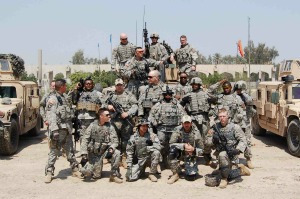
While it is true that outdoor recreation has been shown to
greatly reduce stress and allows for renewed opportunities of camaraderie, a
sense of mission, and physicality that may mirror many of the positive aspects
of military service and can help tackle many of the issues associated with
reintegration, post-traumatic stress, and depression. There's a great community
of outdoor men and women eagerly awaiting the opportunity to share their loves
and passions with our fighting men and women. Often times, we as veterans and
service members simply need to just show up.
It is also true that America's Great Outdoors need the
leadership, experience, and skill sets service members, veterans, and their
families possess to make sure our public lands remain open and pristine to
provide recreation and respite for all of America and to help pave the way for
a healthier, more physically fit nation. There are many opportunities for
leadership and employment, as well as recreation outside. Who better to fill
those roles than the men and women who defended the land? [[BREAK]]
Our tradition of working with, and incorporating military
veterans in our work extends throughout the history of the Sierra Club, most
notably when iconic environmentalist David Brower, himself a veteran of the
10th Mountain Division during World War II led the Club after that war. In
fact, the modern outdoor industry was in large part created by 10th Mountain vets
and others when they came home after that war .
In 2012, the Sierra Club will be partnering with a number of
organizations, among others: the National Outdoor Leadership School, Wilderness
Inquiry, Project Healing Waters Fly Fishing, and Big City Mountaineers to
provide outdoor leadership training and development to our troops so they do
not need to be reliant only on other organizations to get them outside with a
once in a lifetime experience, but can do so on their own, and in the process,
take other members of their family or units outside with them.
Parallel to these programs, the Club is launching a series
of listening sessions in Seattle, Colorado Springs, and Washington DC to hear
from the military how best we, the Sierra Club, can provide support to our
Armed Forces families so they are aware of and active leaders and participants
in, the more than 40,000 local outings that occur year round as part of the
Club's robust local and youth outings programming. These will be followed up
with three weekend outings leadership courses designed by members of the
military, veterans, and Sierra Club members, including military veterans who
are already members of the Sierra Club designed to build off of our other
partnerships in providing year round outings opportunities.
One of the greatest ways to say thank you to a veteran is to
exercise the rights and privileges our sacrifices helped to protect. Those
rights and privileges certainly include your public lands, clean air and clean
water, so join with us and get outside, and take a veteran or military family
with you! Want to know how or get further involved? Please get in touch with stacy.bare@sierraclub.org
Stacy Bare served as a captain in the U.S. Army from
2000-2004 and again from 2006-2007. He served as the Counter Terrorism Team
Chief in Sarajevo, Bosnia, in 2003-04 and as a Civil Affairs Team Chief in
Baghdad, Iraq, from 2006-07. He is now the Military Families and Veterans
Representative for the Sierra Club. Stacy is 6'8"/260+-- and still growing.
November 23, 2011
Q: 'Just what did we fight and bleed for?' A:
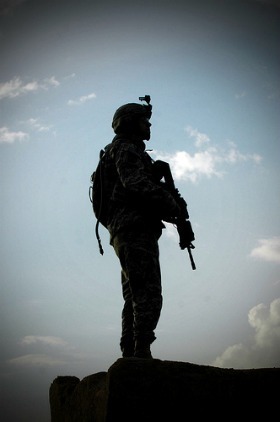
I think that as the United States leaves Iraq and shuffles
toward the exit in Afghanistan, we need to think about how to answer that
question when veterans of our wars there pose it.
This is a difficult one for me, because I think the war in
Afghanistan was the correct response to the 9/11 attacks, but was mishandled
for years after that, and I think the war in Iraq was an unnecessary and very
expensive distraction from that response. Also, we may well see further
violence in both countries that will raise questions about exactly what we
achieved.
Also, today's vets tend to have good BS detectors. Recently
I walked past a small monument to graduates of a high school who were lost in
the Spanish-American War. It stated that they died "for humanity." I don't
think so.
I think my response would be along these lines -- but I'd
welcome your thoughts. "When your
country called, you answered. You did your duty on a mission your country gave
to you. In our system, thankfully, the military does not get to pick and choose
what missions it will undertake -- that is decided by the officials elected by
the people. Those officials are not always right, but they are the leaders we
chose to make that decision. No matter what happens in Iraq and Afghanistan,
you have the thanks of a grateful nation for answering the call."
Is that enough? I don't know. If someone said that to me, I
suspect I would think, Yeah, well where
was everyone else? Why did my friends die and yours didn't?
I don't know. Help me out here.
Why I don't tell people anymore that I am in the military: I'm sick of 'the questions'
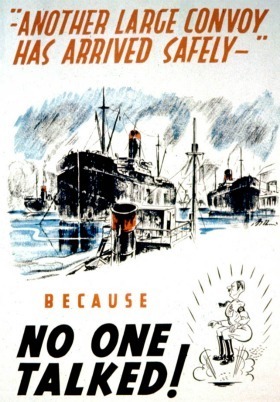
By Crispin Burke
Best Defense department of civil-military affairs
For my first few years in the military, I used to tell
strangers the complete truth about my chosen profession. But after a few
discomfiting conversations, I decided to hide my military service from
strangers. When asked what I do for a living, I sometimes claim that I'm
unemployed, or even that I'm a reporter. There are times I'll claim to be
an accountant. Admittedly, the ruse is difficult to keep up at times. Not many
accountants can console fellow air travelers during a foul-weather approach
into the Syracuse airport by noting that the ILS Runway 10 approach can bring
an aircraft down to two hundred feet above ground level before the pilot can
proceed visually.
It's
a little white lie, sure, but it staves off a lot of awkward situations. In
fact, I wish I'd used it more often.
While
veterans generally appreciate not being treated as poorly as their Vietnam-era
predecessors, today's hero-worship can make many service members uneasy. Without a personal connection
to the military, many Americans base their perceptions of military service a
stoic figure in a recruiting commercial, or a valiant hero in a Hollywood
movie. But no service member could ever measure up to a Hollywood concoction. We're
all just as fallible as anyone else. Even the greatest heroes -- Salvatore
Giunta, Leroy Petry, and Dakota Meyer -- have accepted our nation's highest
honor with candor and humility.
And
while a kind word or a smile is certainly welcome, the lavish praise and
generosity heaped on to service members may be breeding an unwarranted side
effect among younger vets: self-righteous entitlement.
Still
another segment of the public looks upon service members as hapless victims,
and unfortunately for many, this
is all too true. But some erroneously believe that all veterans invariably
suffer from Post-Traumatic Stress Disorder; while others presume that we've all
been subjected to years' worth of brainwashing. To some, a young man or woman
shipping off to Basic Training might as well be going to the Gulag. I once
visited my old high school and revealed that I had just been commissioned as a
lieutenant in the Army. One woman gasped, covering her mouth, "How much
longer do you have left?" Responding, "As long as I like," probably
did little to ease her mind. (And, in truth, my blog will probably
get me fired long before that.)
The
fact of the matter is that I've become a better person for my service in the
military. And even though the job is not without its bouts
of frustration, it still has its enjoyable moments. Plus, it pays the
bills. How many people can do that these days? [[BREAK]]
Perhaps
most important of all, many Vets keep quiet about their service to avoid...the
questions.
"My
friend's cousin Steve is in the Army or the Navy or something like that. Do you
know him?" (Sorry, missed the FRAGO that
designated one day as "Everyone in the Armed Forces gets together and introduces
themselves day.")
"Is
war really like Call of Duty: Modern Warfare 3?" (Never played COD:MW3. But
rest assured, this video game is about as hard-hitting and realistic as
it gets.)
"There
are girls in the Army? When did they start letting girls in the Army?" (You'd
be surprised at how often this one comes up.)
"What's
Iraq like?" (Do you want metrics? I seem to have forgotten my Excel
spreadsheets and PowerPoint slides.)
Which
brings me to my point, so eloquently spoken by one of my fellow bloggers, "What do you vets want"? Try this on for size: Most vets
simply want to be treated like human beings. In other words, stop confusing the
individual with the institution.
Strangers
may think nothing of dumping their ill-conceived sentiments regarding foreign
affairs on the nearest service member. But that veteran sitting next to you on
the plane is just as responsible for foreign policy as the average AIG employee
is for the financial meltdown, or a doctor is for ballooning medical costs.
You
see, most service members would rather not talk about work during their
off-time. But this has little to do with the horrors of war. After working
twelve to fourteen hour days, often without weekends, the last thing any
service member will want to talk about is, well, more work. I realize that
the institution is fascinating because, for many, it's a mystery. But there are
times I wish I could just hide that portion and force strangers to look at me
as a regular person.
We
may wear the same uniforms, but we're an organization of 2.3 million
individuals. Some are parents, some aren't. Some like baseball, others
football, others may not care much for sports at all. Some re-enact Civil War
battles, some play World of Warcraft. In an organization 2.3 million strong,
you might even find the occasional brony.
What
do we want?
We
neither want to be looked up to nor down upon. More often than not, we just
want our fellow Americans to look past the uniform and see the person inside
of us.
Don't
tell anyone, but Maj. Crispin J. Burke is a U.S. Army officer who has served in
Iraq (which is hot), Fort Bragg, Honduras, Fort Drum (which is not), and
Germany (which is foggy and used to invade its neighbors on rainy Thursdays).
He is a contributor to Small Wars Journal, and flies his own blog, Wings Over Iraq. Insert
standard disclaimer here about not reflecting anyone's opinions.
George C. Marshall to George F. Kennan on executing a major policy: 'Avoid trivia'
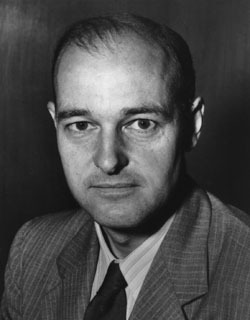
I recently drove down to the terrific George C.
Marshall Library in beautiful Lexington, Virginia, to do a final couple of
days of research there. (Btw, eat at the Red Hen, downtown.) While I
was going through folders (notes to Patton, even Marshall's desk litter,
including his income tax statement), one of the researchers there showed me the
transcript of an interview done with George F. Kennan in February 1953 about the
making of the Marshall Plan, perhaps the most important foreign-policy action
of the United States in the 20th century.
Marshall, not long after returning from Paris, called Kennan
into his office. "After discussing the problem on which we were to work he said
that he had only one piece of advice to give: 'Avoid trivia.' That was a nice
laconic piece of advice, wasn't it?"
Thomas E. Ricks's Blog
- Thomas E. Ricks's profile
- 436 followers



